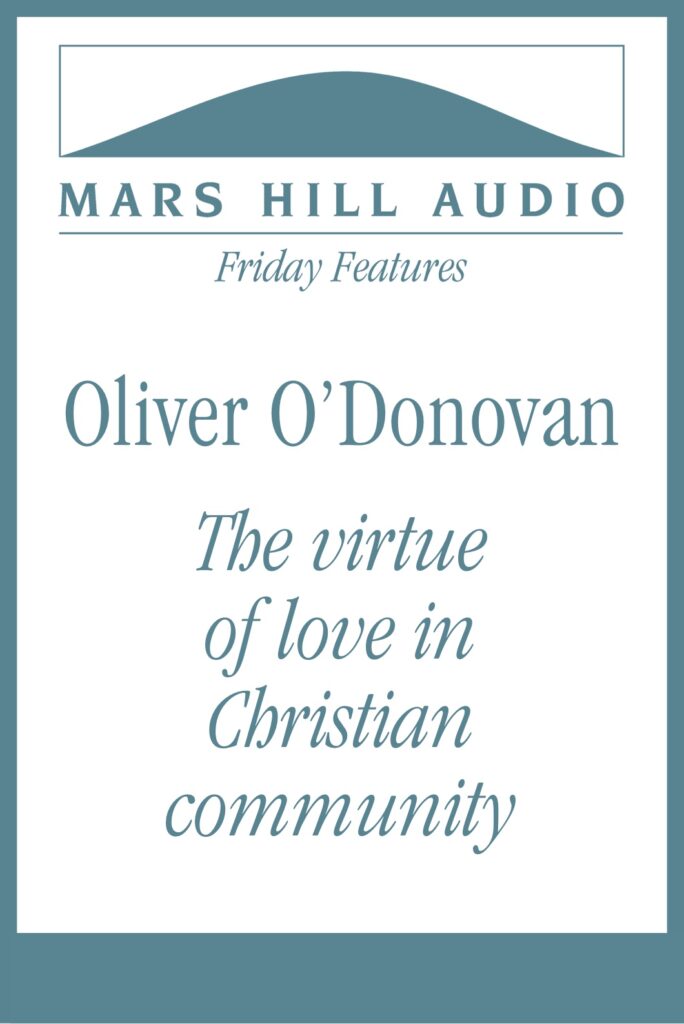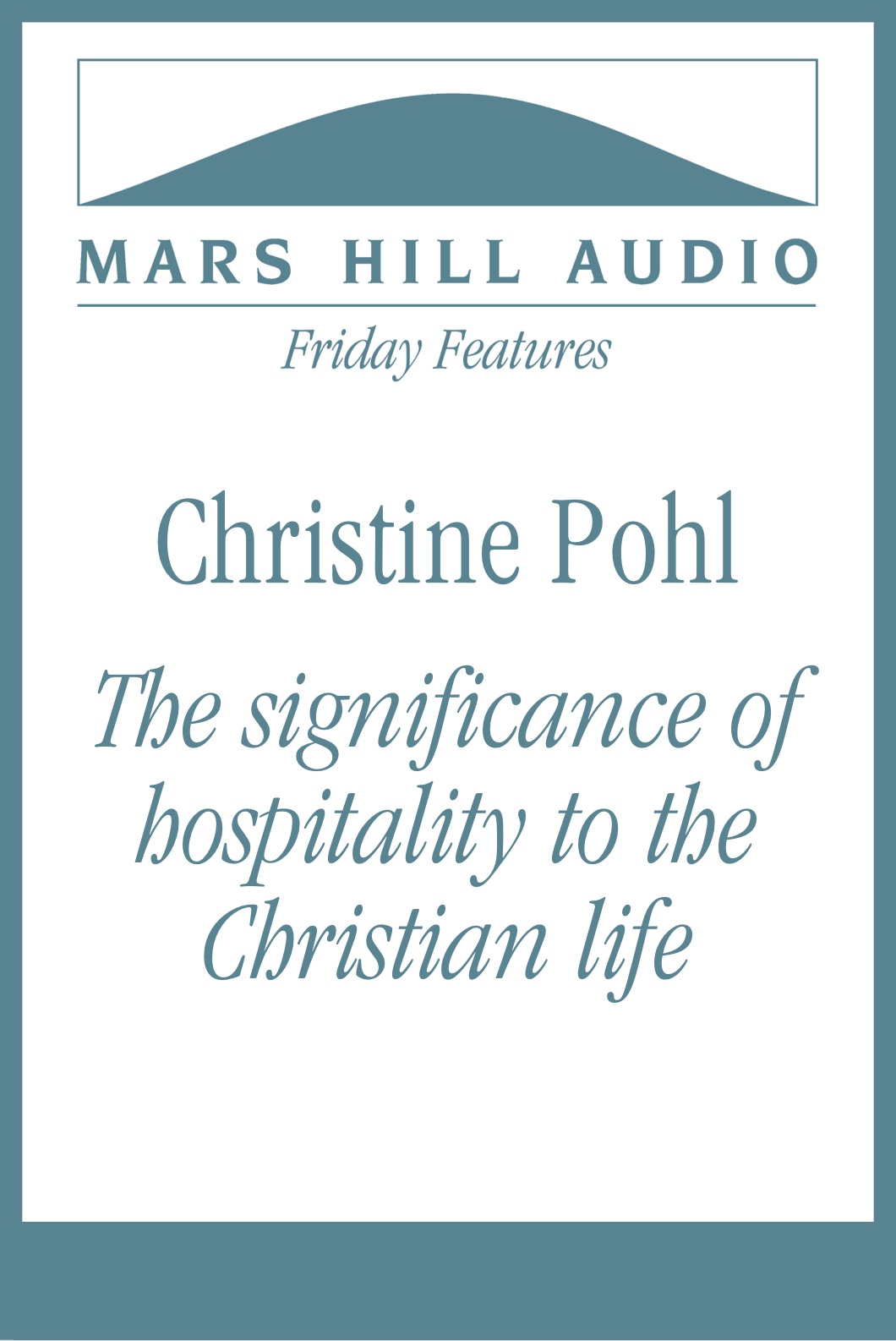
released 7/9/2021
In conversation with moral philosopher Oliver O’Donovan, and with readings from his book, Entering into Rest (Eerdmans, 2017), Ken Myers explores a central theme in O’Donovan’s work: that we are created to enjoy loving relationships in community. Human community — fulfilled in the eschatological Kingdom, anticipated now in the life of the Church — requires the recognition of what O’Donovan calls “the sovereignty of love.” O’Donovan identifies pride as the sin against community, for reasons that emerge in the readings in today’s Feature.
27 minutes
PREVIEW
The full-length track for this audio is only available to paid members and to listeners with a free Visitor’s Pass. If you are a member, log in here. If you would like a Visitor’s Pass, sign in here. You may purchase one of our complete memberships here. Happy listening!
More to hear . . .
Two interviews with Christian Pohl are presented in this Feature. In a 1999 conversation, Pohl talks about her book Making Room: Recovering Hospitality as a Christian Tradition (Eerdmans). Then she discusses her 2012 book Living into Community: Cultivating Practices That Sustain Us (Eerdmans).
This feature is available to listeners with a Mars Hill Audio membership.
Related reading and listening
- Cultivating the Virtue of Reverence — Paul Woodruff (1943–2023) discusses the importance of reverence as a virtue that enriches relationships, elevates civic life, and helps leaders to wield power wisely. (53 minutes)
- Antagonism or fruitfulness? —
FROM VOL. 108 Jean Porter describes how natural law justifies legal and moral authority within the life of the human person. (17 minutes) - The collapse of public life —
FROM VOL. 154 D. C. Schindler explains how liberalism sought to make way for individuals to function together without any orientation to an explicit common good. (37 minutes) - To see people as people — Anthony Bradley argues that a recovery of Christian personalism is needed to counter the dehumanization, polarization, and tribalism of our day. (45 minutes)
- The personal element in all knowing — Mark Mitchell connects key aspects of Michael Polanyi’s conception of knowledge with Matthew Crawford’s insistence that real knowing involves more than technique. (34 minutes)
- A brief for “prophetic Thomism” — David Decosimo on assuming a charitable posture toward pagan virtue
- Etiquette and ethics — In this essay, Judith Martin (a.k.a. Miss Manners) argues that etiquette is “civilization’s first necessity” and an indispensable societal virtue. (21 minutes)
- Against hacking babies — Oliver O’Donovan raises questions about IVF and the technologically ordered motive for efficiency
- Impact of “infotainment” on community — Neil Gabler and C. John Sommerville discuss how the mentalities conveyed by our experience with communications media work against the nurturing of community. (36 minutes)
- Eugenics and the rise of “evolutionary ethics” —
FROM VOL. 70 Richard Weikart describes evolutionary ethics and examines the ties between national racism and the eugenics movements of the late nineteenth and early twentieth centuries. (16 minutes) - The digital revolution and community —
FROM VOL. 7 Ken Myers talks with Jane Metcalfe, the founder of WIRED Magazine, about technology and community. (8 minutes) - Education that counters alienation — In this lecture, Jeanne Schindler explores how digital technologies warp not only education but our experience of being human. (30 minutes)
- The fatal polytheism of late liberalism — Oliver O’Donovan on the failure that leads to social collapse, marked by conflict, suspicion, and violence
- Courtesy as a theological issue —
FROM VOL. 37 Donald McCullough discusses his insights into the increasingly coarse nature of society and the theological foundations for courtesy. (12 minutes) - Insisting that political leaders are incapable of obeying Christ — Oliver O’Donovan on the unintended consequences of the First Amendment to the U.S. Constitution.
- The historian’s communal role as storyteller —
FROM VOL. 127 Historian Christopher Shannon discusses how American academic historical writing presents a grand narrative of progressivism, which it defends by subscribing to an orthodoxy of objective Reason. (21 minutes) - The gift of objective reality — Moral philosopher Oliver O’Donovan makes an argument for the consistency of the idea of law when it is conceived in a theological context. (40 minutes)
- Friendship and life together — In a lecture at Providence College, Ken Myers explores how the concept of friendship, which used to be central to political philosophy, was banished from considerations of public life as the state was exalted over society. (53 minutes)
- Freedom as conformity to reality — W. Bradford Littlejohn summarizes the definitions of liberty offered by Richard Bauckham and Oliver O’Donovan
- The sovereignty of love — In this 2022 lecture, Oliver O’Donovan explains the historical background — and present consequences — of the assertion by Jesus of two great commands. (67 minutes)
- Blest be the ties of language that bind us — Marion Montgomery on the precious gift of words
- The academy’s deconstruction of both person and community — Marion Montgomery on cultivating “a deportment of intellect governed by a continuing concern for the truth of things”
- O’Donovan, Oliver — FROM THE GUEST PAGE: Oliver O’Donovan held teaching posts at Wycliffe Hall, Oxford and Wycliffe College Toronto before becoming Regius Professor of Moral & Pastoral Theology and Canon of Christ Church at the University of Oxford in 1982.
- Community, the giver of freedom — Thomas H. Naylor and William H. Willimon on why suspicion about big government shouldn’t take the form of autonomous individualism
- Why kings are compelling — Historian Francis Oakley describes how the modern idea of “secular” politics is a striking departure in human history. (32 minutes)
- Christology and human relationality — Joseph Ratzinger on how the longing for eternity expressed in human love is an analogue of Trinitarian love
- Conscience seared with a red-hot iron — Oliver O’Donovan on the convicting role of a good conscience
- Culture in light of Easter — Oliver O’Donovan rejects a gnostic reading of redemption
- Welcoming one another — Christine Pohl describes the practice of hospitality in Church history and the particular challenges to hospitality we face in our era. (30 minutes)
- The basic act and order of things — David L. Schindler (1943–2022) insists that the reduction of love to a matter of private and personal sentiment, piety, or good will — is one of the fundamental disorders of modern culture. Christians should know better. (39 minutes)
- Religion within the bounds of citizenship — In a 2006 lecture, Oliver O’Donovan argues that the conventional way of describing Western civil society creates obstacles to the participation of believers (Muslim, Christian, and other). (68 minutes)
- The purpose of government and God’s eternal purpose — Philip Turner on understanding the state in light of the eschatological reality of the Church
- Convivial is beautiful — Ivan Illich on “the opposite of industrial productivity”
- Politics in light of the Ascension — Oliver O’Donovan on the necessity of situating all political authority within redemptive history
- Thinking Christianly about the body — Theologian and ethicist Gilbert Meilaender discusses some of the themes he explores in two of his books: Body, Soul and Bioethics; and Bioethics: A Primer for Christians. (19 minutes)
- A foretaste of the kingdom of God — Oliver O’Donovan on the sovereignty of love
- Knowledge transformed by love — David K. Naugle on the reordered thinking of the redeemed
- Redefining gender — In this article from Communio, Margaret Harper McCarthy demonstrates that the attempt to eliminate the givenness of sexual difference rests on a denial of the created person’s origin in and ordination toward relations of love. (68 minutes)
- Marva Dawn on spiritual formation and being Church — This Feature presents an interview with Marva Dawn from Volume 38 of the Journal, during which she talks about concerns discussed in two of her books, related to the spiritual formation of children and a more holistic understanding of sex and intimacy. (23 minutes)
- Freed from the burden of choice — Writing in the mid-1990s, Alan Ehrenhalt reflects on the relationship between authority and community
- Why communities need authority — Alan Ehrenhalt argues that real community can only be sustained when three things are assumed: the goodness of limits, the necessity of authority, and the reality of personal sin. (13 minutes)
- The eclipsing of happiness — Reinhard Hütter on the Christian recognition that happiness is only intelligible in light of the end for which we were created
- Merciless moralism bereft of moral reasons — Dallas Willard explores how moral passions on campuses — and elsewhere — are now immune to rational examination or critique
- Mars Hill Audio Journal, Volume 149 — FEATURED GUESTS: Dru Johnson, Steven L. Porter, Reinhard Hütter, Matthew Levering, David Lyle Jeffrey, and Christopher Phillips
- The first virtue of citizenship: Taking the law seriously — Oliver O’Donovan reflects on how the reality of the Kingship of Christ must be affirmed as a present reality
- Reasoning about values — Revisiting a 1974 text that examined the mutual animosities of the 1960s
- “Whose kingdom shall have no end” — Oliver O’Donovan and his mentor, George B. Caird, offer lessons from the book of Revelation for thinking about politics
- The social context of freedom — Brad Littlejohn talks about the necessity of a more expansive understanding of freedom, one which recognizes that we are really only free within the social experience of shared meaning and mutual recognition. (17 minutes)
- The Bruderhof’s Christ-centered community — Clare Stober discusses the book she edited of stories of the Bruderhof, a network of 26 community settlements around the world. (30 minutes)
- The Sixth Commandment and the obligation to protect public health — Ethicist Gilbert Meilaender explains why our experience with COVID-19 has made it difficult for many — citizens and officials — to honor a proper obligation to protect public health. (17 minutes)
